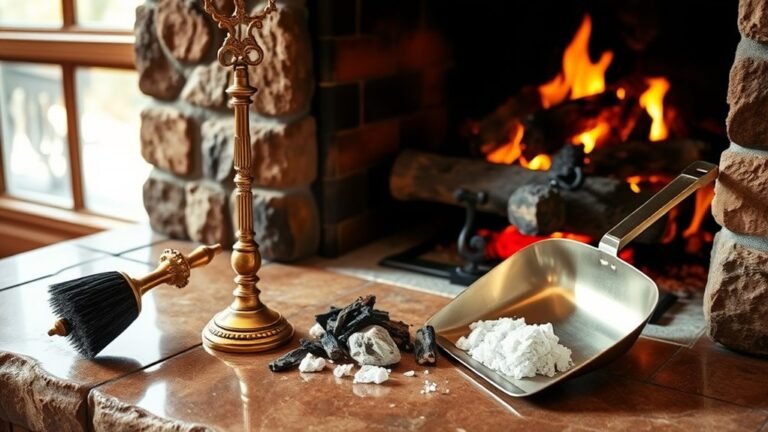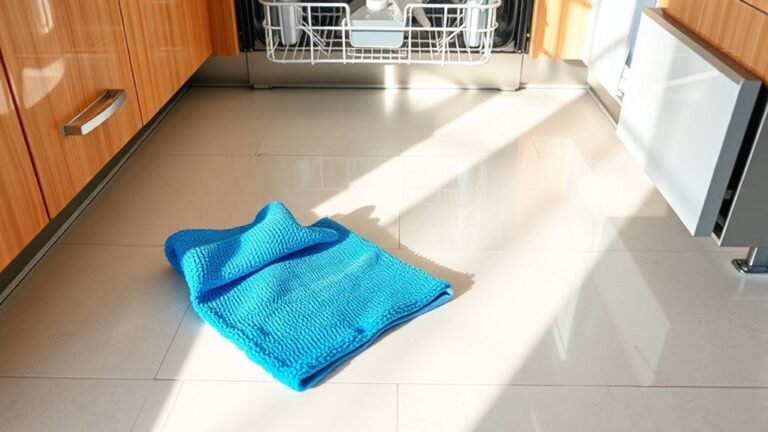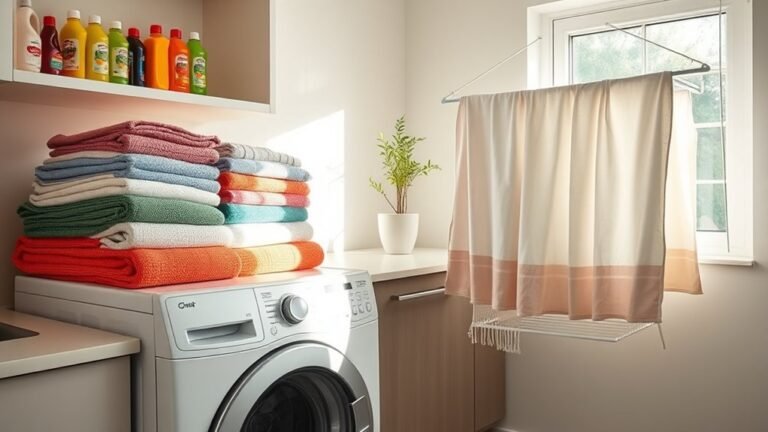Essential Tools for Cleaning Grease
When cleaning grease, you’ll want heavy-duty degreasers that break down oils without harming surfaces. Microfiber cloths are great for wiping without spreading grease, while stiff-bristled scrub brushes and steel wool pads tackle tough residue. Use plastic scrapers to protect delicate areas and disposable gloves to keep your hands safe. Don’t forget absorbent towels for quick cleanup and steam cleaners for deep grease removal. Keep these in mind, and you’ll discover even more tools to make grease cleanup easier and safer.
Understanding Different Types of Grease

Before you can choose the right cleaning tools, it’s important to understand the different types of grease you might encounter. Grease compositions vary considerably, influencing how stubborn or easy they are to clean. You’ll find greases made from mineral oils, synthetic oils, or even natural fats, each with unique grease properties like viscosity, melting point, and water resistance. Knowing these properties helps you pick tools that won’t just remove grease but do so efficiently without damaging surfaces. For example, a thick, high-viscosity grease requires stronger scrubbing tools, while lighter greases might respond well to softer brushes or wipes. By understanding what you’re dealing with, you gain freedom from trial and error, ensuring your cleaning efforts are both effective and hassle-free.
Heavy-Duty Degreasers and Their Uses
When grease buildup is tough to remove, heavy-duty degreasers become your best ally. Designed for heavy duty applications, these powerful solutions cut through stubborn grease quickly and efficiently, saving you time and effort. Whether you’re tackling machinery in industrial settings or stubborn kitchen grease, these degreasers break down oils without damaging surfaces. You’ll appreciate their strong formulations that handle thick grime while still being safe when used as directed. Just apply, let it sit briefly, then wipe or rinse away the loosened grease. Choosing the right heavy-duty degreaser means you’re equipped to restore cleanliness and maintain freedom from sticky messes, no matter how stubborn the buildup. With these tools, you’ll have the confidence to conquer even the most challenging grease spots.
Microfiber Cloths for Effective Wiping

You’ll find microfiber cloths incredibly effective at trapping grease without spreading it around. Knowing how to clean and use them properly guarantees they stay efficient and last longer. Let’s explore why they’re a must-have and the best techniques for wiping away stubborn grease.
Benefits of Microfiber
Although many cleaning tools claim to tackle grease effectively, microfiber cloths stand out for their unique ability to trap and lift grease without spreading it around. When you choose microfiber, you’re tapping into its microfiber advantages—like superior cleaning efficiency and the capability to clean surfaces with just water, reducing the need for harsh chemicals. This means you get a thorough clean while keeping your environment safer and more sustainable. Plus, microfiber cloths are durable and reusable, giving you freedom from wasteful single-use wipes. Their fine fibers reach into tiny crevices, ensuring no grease is left behind. By using microfiber, you’re not only boosting your cleaning game but also embracing a smarter, more efficient way to maintain a fresh, grease-free space.
Proper Cleaning Techniques
Mastering proper cleaning techniques with microfiber cloths can make all the difference in removing grease effectively. You want to harness these effective strategies to free yourself from stubborn residue without wasting time or effort. Here’s how to get the most out of your microfiber cloth:
- Dampen the cloth slightly; a bit of moisture helps trap grease rather than spread it around.
- Use gentle, circular motions to lift grease without pushing it deeper into surfaces.
- Rinse and wring the cloth frequently to avoid redistributing grease.
- Allow the cloth to air dry after use to maintain its cleaning power over time.
Stick to these cleaning techniques, and you’ll enjoy a grease-free space with less hassle, giving you the freedom to focus on what matters.
Scrub Brushes With Stiff Bristles
When tackling tough grease, choosing the right scrub brush with stiff bristles can make all the difference. You’ll want to contemplate bristle materials that balance effective grease removal with long-lasting durability. Plus, knowing how to maintain your brush will keep it working well for many cleaning sessions.
Bristle Material Types
Choosing the right bristle material for your stiff scrub brush can make a big difference in tackling grease effectively. You want bristles that balance bristle stiffness and durability, while matching the surface you’re cleaning. Here are four common types to evaluate:
- Nylon: Offers firm bristle stiffness and resists wear, perfect for tough grease on resilient surfaces.
- Natural fibers: Softer bristle stiffness, ideal if you want eco-friendly options with varied bristle shapes.
- Polypropylene: Highly resistant to chemicals and water, with medium stiffness for versatile grease cleanup.
- Wire bristles: Extremely stiff and abrasive, great for heavy-duty grease but use cautiously to avoid damage.
Effective Grease Removal
Three key factors make scrub brushes with stiff bristles your best bet for cutting through grease: bristle firmness, durability, and surface compatibility. When you grab one, you’re equipped to tackle tough grease cutting and stain lifting without fuss. These brushes give you the freedom to clean stubborn grime efficiently, whether on grills, stovetops, or industrial surfaces. Their stiff bristles provide the necessary scrubbing power to break down oils and residues that softer brushes can’t handle. Plus, they’re designed to fit various surfaces, so you don’t have to worry about damage while achieving spotless results. Using a stiff-bristled brush means you can reclaim your space from grease buildup quickly and confidently, freeing you from lingering stains and letting you enjoy a cleaner environment.
Maintenance and Durability
Although scrub brushes with stiff bristles are built to handle tough grease, their effectiveness depends on proper maintenance and durability. To keep your brush in top shape and enjoy equipment longevity, follow these preventive maintenance tips:
- Rinse thoroughly after each use to remove grease and debris.
- Store the brush in a dry, ventilated area to prevent bristle damage.
- Inspect bristles regularly for wear or breakage, replacing the brush as needed.
- Avoid harsh chemicals that can degrade bristle stiffness and handle integrity.
Steel Wool Pads for Tough Residue
When grease builds up stubbornly on pots and pans, steel wool pads can be your best ally. You’ll appreciate steel wool effectiveness for tackling tough residue without too much elbow grease. Its abrasive texture scrapes away grime quickly, freeing you from endless scrubbing. To maximize results, soak the greasy surface in warm, soapy water first—this softens buildup, making your cleaning techniques more efficient. Use gentle circular motions with the steel wool to avoid scratching delicate surfaces. Remember, steel wool is ideal for heavy-duty cleaning but not for non-stick coatings. By mastering these simple steps, you’ll regain control over your kitchen messes and enjoy the freedom of a spotless, grease-free environment without relying on harsh chemicals or complicated tools.
Spray Bottles for Even Application

Spray bottles let you distribute cleaning solutions evenly over greasy surfaces, saving you time and effort. Choosing the right spray bottle types and mastering application techniques can transform your cleaning routine. Here’s how to get the most out of spray bottles:
- Select a spray bottle with adjustable nozzles to control mist or stream for different surfaces.
- Use a fine mist setting for light grease and a stronger jet for stubborn spots.
- Apply evenly by moving the bottle in a steady, sweeping motion to cover the entire area without oversaturating.
- Refill with homemade or commercial degreasers to keep your cleaning freedom intact.
With the right spray bottle and techniques, you’ll tackle grease efficiently and enjoy the freedom to clean on your terms.
Disposable Gloves for Safety
When tackling grease, you’ll want the right disposable gloves to protect your hands from harsh chemicals and grime. Choosing between latex, nitrile, or vinyl gloves depends on your sensitivity and the level of protection you need. Remember to dispose of your gloves properly to avoid spreading contaminants and keep your workspace safe.
Types of Gloves
Choosing the right disposable gloves is essential for protecting your hands from grease and harsh cleaning chemicals. You’ve got options, so here’s a quick guide to help you pick:
- Latex gloves – Flexible and comfortable, great for light-duty tasks but beware of allergies.
- Nitrile gloves – Durable and chemical-resistant, perfect if you want strong protection and freedom to move.
- Vinyl gloves – Affordable and ideal for short tasks, though less durable with grease.
- Polyethylene gloves – Loose-fitting and budget-friendly, best for quick, light jobs without heavy exposure.
Proper Glove Disposal
Now that you know which gloves suit your needs, it’s just as important to handle their disposal properly. When you’re done, don’t just toss used gloves anywhere. Safe disposal isn’t just about cleanliness—it’s about respecting your environment and your freedom to live responsibly. If your gloves are contaminated with grease or chemicals, treat them as hazardous waste and follow local guidelines for disposal. For clean gloves, look into glove recycling programs available in your area to reduce waste. Remember, proper glove disposal prevents contamination and protects others who might handle waste. By taking these simple steps, you maintain control over your impact and support a cleaner, freer world. Your choices matter, so dispose of gloves safely and consider glove recycling whenever possible.
Plastic Scrapers to Avoid Surface Damage
Although metal tools might seem effective for removing grease, plastic scrapers are your best bet to protect delicate surfaces from scratches and damage. When choosing plastic scraper types, consider the following to maintain surface protection while freeing yourself from worry:
- Flexible scrapers contour easily to uneven surfaces, reducing the risk of gouges.
- Rigid scrapers offer firm pressure for tougher grease without metal’s harshness.
- Angled scrapers reach tight corners, making thorough cleaning simpler.
- Interchangeable blade scrapers give versatility, letting you swap for different tasks effortlessly.
Absorbent Towels for Cleanup
Absorbent towels are essential for quickly soaking up grease and preventing it from spreading further. When you’re tackling a greasy mess, choosing towels made from high-quality absorbent materials makes all the difference. These towels pull grease in fast, helping you regain control and avoid bigger cleanup headaches. You’ll want to select towels that combine strong absorbency with towel durability, so they don’t tear or fall apart mid-cleanup. Durable towels let you scrub and wipe without constantly swapping them out, freeing you to finish the job faster. Plus, reusable absorbent towels reduce waste and give you more freedom to clean smarter, not harder. Picking the right absorbent towels empowers you to handle grease spills confidently and keep your space spotless with less hassle.
Steam Cleaners for Deep Cleaning
When grease has settled into surfaces where towels can’t reach, steam cleaners step in as powerful allies for deep cleaning. You’ll appreciate the steam cleaner benefits, like tackling tough grime without harsh chemicals. To get the most out of your device, follow these steam cleaning techniques:
- Preheat your steam cleaner to guarantee maximum pressure and temperature.
- Target greasy spots slowly, allowing steam to loosen residue.
- Use the appropriate nozzle for different surfaces to avoid damage.
- Wipe away loosened grease with a microfiber cloth for a spotless finish.
With a steam cleaner, you’re free to clean deeply and efficiently, restoring surfaces without effort. Embrace this tool and let it simplify your fight against stubborn grease.
Frequently Asked Questions
How Often Should I Clean Grease-Prone Areas in My Kitchen?
Did you know that grease buildup can double bacteria growth in just 24 hours? To keep your kitchen fresh and safe, you should stick to a regular cleaning frequency. Aim to wipe down grease-prone areas daily or at least every couple of days. This steady kitchen maintenance helps you avoid tough grime later, giving you more freedom to enjoy cooking without worrying about messy, sticky surfaces.
Can Natural Ingredients Be Used as Effective Degreasers?
Yes, you can definitely use natural degreasers for effective cleaning. Ingredients like vinegar, baking soda, and lemon juice work wonders on grease without harsh chemicals. They’re not only eco-friendly but also give you the freedom to clean your space safely and naturally. If you’re looking to ditch synthetic cleaners, these natural options can tackle grime while keeping your kitchen fresh and toxin-free. Give them a try—you’ll love the results!
What Are the Best Storage Tips for Cleaning Tools?
Did you know that 90% of people waste time searching for misplaced tools? To avoid this, focus on smart tool organization. Use clear storage solutions like labeled bins or hanging racks to keep your cleaning tools visible and accessible. This way, you’ll save time and maintain the freedom to tackle any mess quickly. Keeping things tidy not only boosts efficiency but also gives you peace of mind, so you’re always ready to clean up effortlessly.
How Do I Dispose of Grease Safely After Cleaning?
When it comes to grease disposal, you want to stick to safe methods that protect both you and the environment. Never pour grease down your drain or toilet—it can clog pipes and harm water systems. Instead, let the grease cool and solidify, then scrape it into a sealed container or bag. Dispose of it in your regular trash or check if your local waste facility accepts grease. This way, you keep things clean and hassle-free.
Are There Eco-Friendly Alternatives to Steel Wool Pads?
If you’re looking for eco-friendly alternatives to steel wool pads, you’ll love bamboo scrubbers and biodegradable sponges. They’re gentle on the environment and tough on grime, giving you the freedom to clean without guilt. Bamboo scrubbers are naturally durable and compostable, while biodegradable sponges break down easily after use. Choosing these options helps you stay green and keep your space spotless—without sacrificing effectiveness or your values.






